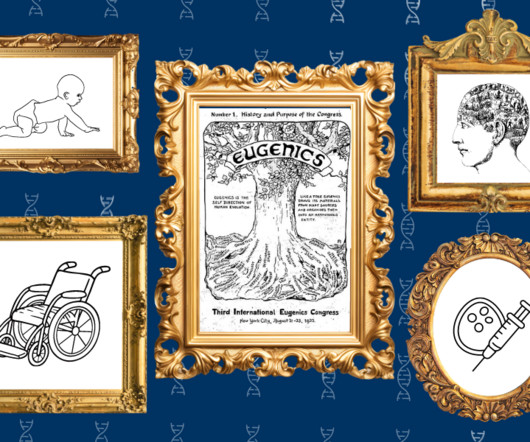New genetic cause of obesity could help guide treatment
Science Daily: Pharmacology News
JUNE 20, 2024
Scientists have discovered a new cause of why people who lack a specific blood group are genetically predisposed to be overweight or obese.

Science Daily: Pharmacology News
JUNE 20, 2024
Scientists have discovered a new cause of why people who lack a specific blood group are genetically predisposed to be overweight or obese.

Berkeley Public Health: Racism and Health
JUNE 21, 2024
Osagie K. Obasogie, a professor of law and bioethics, has teamed up with the Los Angeles Review of Books to launch a two-year, national conversation on the history of eugenics and the ways it still shapes science, medicine and technology. The post The legacy of eugenics appeared first on Berkeley News.
This site is protected by reCAPTCHA and the Google Privacy Policy and Terms of Service apply.

Public Health Insider
JUNE 20, 2024
This training video covers the sources of poor indoor air and how to improve it through a variety of specific steps. This is especially useful if you own or operate a business, childcare, adult family home, faith-based organizations, or other area where people gather inside. The post Learn how to improve indoor air quality with new training video appeared first on PUBLIC HEALTH INSIDER.

Public Health Newswire
JUNE 18, 2024
Public health professionals encouraged to be ‘champions of veracity’

Science Daily: Pharmacology News
JUNE 20, 2024
Adults with a history of low back pain went nearly twice as long without a recurrence of their back pain if they walked regularly, a world-first study has found.

Smart Data Collective
JUNE 20, 2024
There are a lot of great things that you can do to become a more successful data scientist, which includes engaging in certain hobbies.
Public Health Engage brings together the best content for public health professionals from the widest variety of industry thought leaders.

Public Health Newswire
JUNE 18, 2024
Public health professionals encouraged to be ‘champions of veracity’

Science Daily: Pharmacology News
JUNE 17, 2024
New research shows when animals are fed a diet high in saturated fat for nine weeks, their gut bacteria change in ways that influence brain chemicals and fuel anxiety.

Black Health Matters
JUNE 18, 2024
June 19th is not only the day we celebrate Juneteenth, but this year will also be the 16th anniversary of World Sickle Cell Awareness Day. It is also the day that a collaboration of 46 nonprofit, community-based organizations and medical providers in the Northeast U.S. will shine the light on sickle cell disease by turning buildings, stadiums, museums, hospitals, and other landmarks across their cities red to support patients with SCD.

CDC National Center for National Center for HIV, V
JUNE 20, 2024
Preventing Chronic Disease (PCD) is a peer-reviewed electronic journal established by the National Center for Chronic Disease Prevention and Health Promotion. PCD provides an open exchange of information and knowledge among researchers, practitioners, policy makers, and others who strive to improve the health of the public through chronic disease prevention.

Maternal Health Task Force
JUNE 18, 2024
I double checked my packing list in preparation for my trip to Rwanda. Three weeks away from my home in Kenya was a long time, so I wanted to make sure I had all the essentials. Already in the suitcase were a couple pair of shoes, both open and closed-toe. Also, my favorite black trousers and a black and white top, a pairing that constitutes my best “official” attire, suitable to wear while presenting to a technical working group of maternal health care providers.

Science Daily: Pharmacology News
JUNE 17, 2024
The relationship between mother and child may offer clues to the mystery of why humans live longer than expected for their size -- and shed new light on what it means to be human -- according to a new study.

Black Health Matters
JUNE 18, 2024
Sickle Cell Disease affects the African American community, with our community representing 90% of those living with the condition. About 1 in 13 Black babies are born with this blood disorder as this condition alters the structure and functionality of their red blood cells, impacting their journey through the circulatory system and resulting in a range of health challenges.

CDC National Center for National Center for HIV, V
JUNE 20, 2024
Supporting Local Public Health and Planning Professionals to Implement Built Environment Changes: A Technical Assistance Program to Promote Physical Activity in Texas

Better Health For All
JUNE 17, 2024
A note on terminology: For purposes of brevity, this blog uses the terms ‘trans men’ or ‘transmasculine’ but can be taken as referring also to non-binary people and anyone assigned female at birth but who identifies differently. Discussions around HIV treatment and prevention in the trans community have historically been focussed on the staggeringly high rates of HIV in trans women, particularly those who have sex with men.

Science Daily: Pharmacology News
JUNE 18, 2024
Scientists discovered that Neolamprologus savoryi fish use punishment to encourage offspring to cooperate in brood care, revealing advanced cognitive abilities previously thought unique to higher vertebrates. This study highlights that punishment for promoting cooperation exists beyond human societies, prompting a reevaluation of animal intelligence.

Black Health Matters
JUNE 15, 2024
Sydney Barned, MD, is a stage 4 lung cancer survivor and advocate. Dr. Barned graduated from the University of The West Indies Faculty of Medical Sciences Jamaica in 2012 and is currently a practicing internal medicine specialist at Anne Arundel Medical Center in Annapolis, Maryland. It was during her year of medical residency when she noticed decreased exercise endurance and began wheezing, which later resulted in her lung cancer diagnosis.

Science Daily: Pharmacology News
JUNE 18, 2024
A single large population of healer cells, called regulatory T cells, is whizzing around our body -- not multiple specialist populations restricted to specific parts of the body as previously thought. These cells shut down inflammation and repair the collateral damage to cells caused after our immune system has responded to injury or illness. Tests, in mice, of a drug developed by the researchers showed that regulatory T cells can be attracted to specific body parts, boosted in number, and activ

Science Daily: Pharmacology News
JUNE 19, 2024
Roughly one in four U.S. households have soil exceeding the new U.S. Environmental Protection Agency's lead screening levels of 200 parts per million (ppm), halved from the previous level of 400 ppm, a new study found. For households with exposure from multiple sources, the EPA lowered the guidance to 100 ppm; nearly 40% of households exceed that level, the study also found.

Science Daily: Pharmacology News
JUNE 20, 2024
A wearable health monitor can reliably measure levels of important biochemicals in sweat during physical exercise. The 3D-printed monitor could someday provide a simple and non-invasive way to track health conditions and diagnose common diseases, such as diabetes, gout, kidney disease or heart disease. The monitor was able to accurately monitor the levels of volunteers' glucose, lactate and uric acid as well as the rate of sweating during exercise.

Science Daily: Pharmacology News
JUNE 18, 2024
The rise of advanced artificial intelligence (edge AI) could well mark the beginning of a new era for sustainable agriculture. A recent study proposes a roadmap for integrating this technology into farming practices. The aim? To improve the efficiency, quality and safety of agricultural production, while addressing a range of environmental, social and economic challenges.

Science Daily: Pharmacology News
JUNE 17, 2024
Brain-computer interfaces or BCIs hold immense potential for individuals with a wide range of neurological conditions, but the road to implementation is long and nuanced for both the invasive and noninvasive versions of the technology. Scientists have now successfully integrated a novel focused ultrasound stimulation to realize bidirectional BCI that both encodes and decodes brain waves using machine learning in a study with 25 human subjects.

Science Daily: Pharmacology News
JUNE 17, 2024
One in four parents describe getting their young child to bed as difficult -- and these parents are less likely to have a bedtime routine, more likely to leave on a video or TV show, and more likely to stay with their child until they're asleep.

Science Daily: Pharmacology News
JUNE 18, 2024
The potential of quantum computers is currently thwarted by a trade-off problem. Quantum systems that can carry out complex operations are less tolerant to errors and noise, while systems that are more protected against noise are harder and slower to compute with. Now a research team has created a unique system that combats the dilemma, thus paving the way for longer computation time and more robust quantum computers.

Science Daily: Pharmacology News
JUNE 20, 2024
A new study presents video evidence that at least one species of terrestrial leech can jump, behavior that scientists have debated for more than a century.

Science Daily: Pharmacology News
JUNE 17, 2024
Researchers hope their DIY machine will help designers around the world experiment with making their own, sustainable fashion and other textiles from a range of natural ingredients -- maybe even the chitin in crab shells or agar-agar from algae.

Science Daily: Pharmacology News
JUNE 20, 2024
A team of scientists reports a new milestone for the sustainable production of green hydrogen through water electrolysis. Their new catalyst design harnesses so far unexplored properties of water to achieve, for the first time, an alternative to critical raw materials for water electrolysis at industrial-relevant conditions.

Science Daily: Pharmacology News
JUNE 17, 2024
Astronomers have discovered a double-record-breaking pair of quasars. Not only are they the most distant pair of merging quasars ever found, but also the only pair confirmed in the bygone era of the Universe's earliest formation.

Science Daily: Pharmacology News
JUNE 19, 2024
An international team of scientists has recently found that non-native species are expanding their ranges many orders of magnitude faster than native ones, in large part due to inadvertent human help. Even seemingly sedentary non-native plants are moving at three times the speed of their native counterparts in a race where, because of the rapid pace of climate change and its effect on habitat, speed matters.

Science Daily: Pharmacology News
JUNE 21, 2024
Meet SQUID, a new computational tool. Compared with other genomic AI models, SQUID is more consistent, reduces background noise, and can yield better predictions regarding critical mutations. The new system aims to bring scientists closer to their findings' true medical implications.

Science Daily: Pharmacology News
JUNE 20, 2024
The carbon stored globally by plants is shorter-lived and more vulnerable to climate change than previously thought, according to a new study.

Science Daily: Pharmacology News
JUNE 19, 2024
Geologists studied Titan's shorelines and showed through simulations that coastlines of the moon's methane- and ethane-filled seas have likely been shaped by waves. Until now, scientists have found indirect and conflicting signs of wave activity, based on Cassini images of Titan's surface.

Science Daily: Pharmacology News
JUNE 18, 2024
A white wine over 2,000 years old, of Andalusian origin, is the oldest wine ever discovered.

Science Daily: Pharmacology News
JUNE 17, 2024
An international team of scientists has identified the oldest fossil of a sea-going reptile from the Southern Hemisphere -- a nothosaur vertebra found on New Zealand's South Island. 246 million years ago, at the beginning of the Age of Dinosaurs, New Zealand was located on the southern polar coast of a vast super-ocean called Panthalassa. 'The nothosaur found in New Zealand is over 40 million years older than the previously oldest known sauropterygian fossils from the Southern Hemisphere.
Let's personalize your content